#Comic Code Authority
Text
Panda Redd on the Comic Code Authority
1 note
·
View note
Text
batman should be campy because a billionaire playboy orphan who witnessed his parents get shot in front of him, who then started dressing up as a flying rodent while fighting a clown, a lawyer, a plant lady, and some other rich guys is inherently campy. it’s silly and tragic and confusing all at once. let him be campy again plz 💔
#golden age batman artists knew EXACTLY what batman was- ‘queer and obsessive’ (yes that’s a quote)#im going to shoot the comics code authority in the head#“the batman is inherently gay” morrison sweetheart can we bring that back???#being silly and campy ties INTO his identity!!!!!!!! aughagahah h#ignore these ramblings of a mad man#batman#bruce wayne#batfam#dc comics#bruce wayne meta#batman meta
174 notes
·
View notes
Text
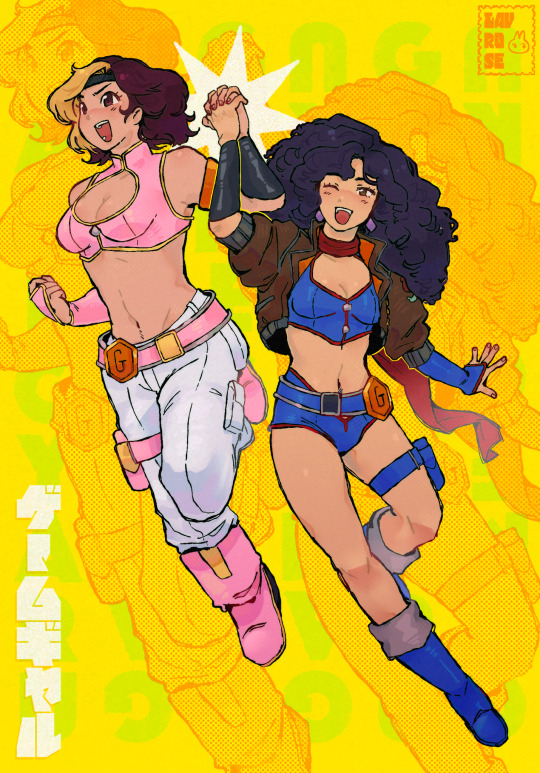
the power of friendship!!!
#game grumps#game gyaru#game grumps fanart#fanart#lavrose art#art#illustration#these designs are so cute to me regardless of the fact that they are the anime girlsonas of 40y/o men#i honestly kinda wanted to draw some cute anime girls with bodonhonkaroos so this is the result#also wanted it to look a bit comic book-y so the signature is traced from the comics code authority logo LOL
165 notes
·
View notes
Text
Instead of saying "I want to kill myself" I now say "I'm going to violate the Hays Code." "I'm going to violate YouTube terms of service." Or "I'm going to violate the comics code." And I hate realizing all three of those mean the same thing. Progress is moving backwards in this society.
#anti censorship#anti capitalist#anti capitalism#196#my thougts#free speech#leftist#left#leftism#youtube#hays code#comics code authority
173 notes
·
View notes
Note
Was the Comics Code as bad as the Hays Code?
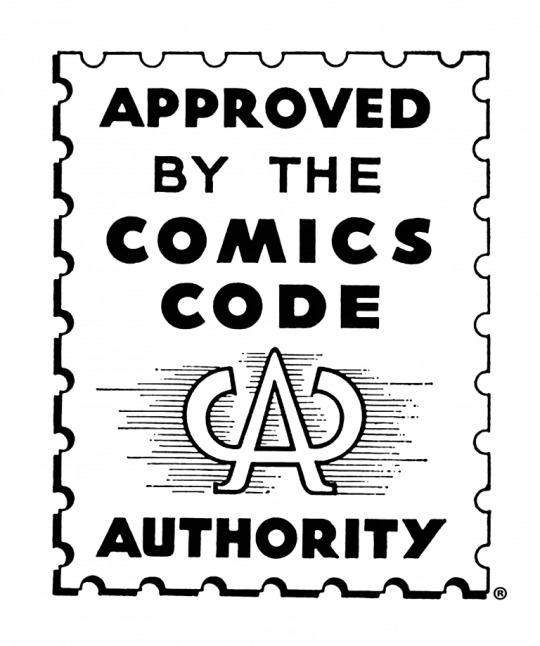
That's a really good question!
I suppose it depends on what you mean by "as bad" - are we talking about the overall impact of the Code on American pop culture or are we talking about the actual content of the Code and what it banned and/or mandated in terms of artistic expression?
I've written a little bit about the Hays Code here, but my main focus was on subtextual judaism in Hollywood generally rather than what the Code was and what its impact on American cinema was.
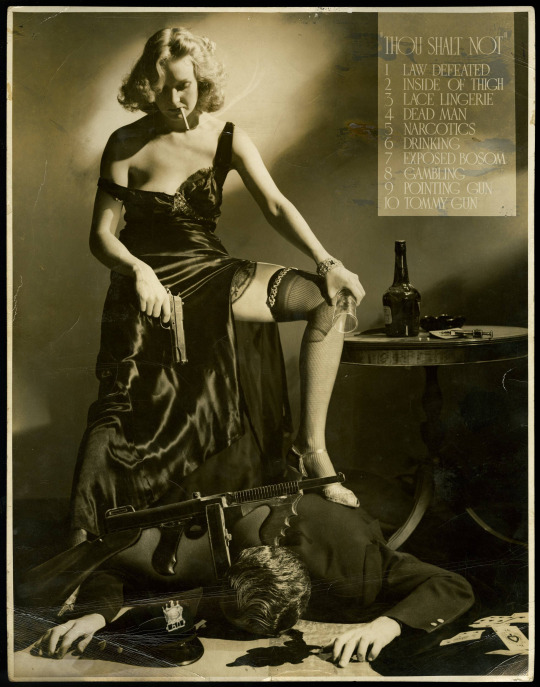
So what did the Hays Code actually include?
One of the few positive things you can say about it is that the men who devised it were quite clear and forthright about what would and wouldn't be allowed, in comparison to the vagueness and inconsistency of the modern MPAA. So here's the list of what couldn't be shown:
Pointed profanity—by either title or lip—this includes the words God, Lord, Jesus, Christ (unless they be used reverently in connection with proper religious ceremonies), Hell, S.O.B., damn, Gawd, and every other profane and vulgar expression however it may be spelled; (You'll notice that the Code is very much a snapshot of the transition from silent movies to "talkies," with the discussion of how profanity is spelled as well as produced via "lip.")
Any licentious or suggestive nudity—in fact or in silhouette; and any lecherous or licentious notice thereof by other characters in the picture;
The illegal traffic in drugs;
Any inference of sex perversion; (i.e anything having to do with LGBT+ people and culture. For more on the impact of the Hays Code on the LGBT+ community, see the excellent documentary the Celluloid Closet.)
White slavery; (the 1920s version of sex trafficking, but with added racism!)
Miscegenation;
Sex hygiene and venereal diseases;
Scenes of actual childbirth—in fact or in silhouette;
Children's sex organs;
Ridicule of the clergy;
Willful offense to any nation, race or creed; and (this one was really honored in the breach more than the observance when it came to nations, races, and creeds of non-dominant groups in society.)
The following things could be shown, but "special care be exercised in the manner in which the following subjects are treated, to the end that vulgarity and suggestiveness may be eliminated and that good taste may be emphasized:"
The use of the Flag;
International Relations (avoid picturizing in an unfavorable light another country's religion, history, institutions, prominent people and citizenry); (again, depended a lot on what country you're talking about.)
Arson;
The use of firearms;
Theft, robbery, safe-cracking, and dynamiting of trains, mines, buildings, et cetera (having in mind the effect which a too-detailed description of these may have upon the moron); (I guess the idea was that the MPPDA believed very strongly in the idea that media could affect people's behavior through imitation, but the use of the word "moron" gives me eugenics vibes.)
Brutality and possible gruesomeness;
Technique of committing murder by whatever method;
Methods of smuggling;
Third-Degree methods; (i.e, torture)
Actual hangings or electrocutions as legal punishment for crime;
Sympathy for criminals; (this was a big one; Hollywood had done very well from gangster films, so a lot of creators had to do some careful threading of the needle to keep the genre alive. One dodge that they came up with was that they would have a duplicate "final reel" in which the gangster would have their inevitable comeuppance, and then remove the final reel when the censors had left the theater. Very popular with white rural teens.)
Attitude toward public characters and institutions; (again, Hollywood shifting from being anti- to pro-establishment.)
Sedition;
Apparent cruelty to children and animals;
Branding of people or animals;
The sale of women, or of a woman selling her virtue;
Rape or attempted rape;
First-night scenes; (i.e, wedding nights)
Man and woman in bed together; (hence the eventual TV practice of showing married couples in separate beds in the 50s)
Deliberate seduction of girls;
The institution of marriage;
Surgical operations;
The use of drugs;
Titles or scenes having to do with law enforcement or law-enforcing officers;
Excessive or lustful kissing, particularly when one character or the other is a "heavy".
So in general, we can say that the Hays Code was extremely sex-negative, very concerned about crime and anti-establishment thinking, sexist, racist, and homophobic, and in general afraid of offending anybody.
So what about the Comics Code Authority?
So this is what the Comics Code looked like in 1954:
Crimes shall never be presented in such a way as to create sympathy for the criminal, to promote distrust of the forces of law and justice, or to inspire others with a desire to imitate criminals.
If crime is depicted it shall be as a sordid and unpleasant activity.
Policemen, judges, government officials, and respected institutions shall never be presented in such a way as to create disrespect for established authority.
Criminals shall not be presented so as to be rendered glamorous or to occupy a position which creates a desire for emulation.
In every instance good shall triumph over evil and the criminal punished for his misdeeds.
Scenes of excessive violence shall be prohibited. Scenes of brutal torture, excessive and unnecessary knife and gunplay, physical agony, the gory and gruesome crime shall be eliminated.
No comic magazine shall use the words "horror" or "terror" in its title.
All scenes of horror, excessive bloodshed, gory or gruesome crimes, depravity, lust, sadism, masochism shall not be permitted.
All lurid, unsavory, gruesome illustrations shall be eliminated.
Inclusion of stories dealing with evil shall be used or shall be published only where the intent is to illustrate a moral issue and in no case shall evil be presented alluringly, nor so as to injure the sensibilities of the reader.
Scenes dealing with, or instruments associated with walking dead, torture, vampires and vampirism, ghouls, cannibalism, and werewolfism are prohibited.
Profanity, obscenity, smut, vulgarity, or words or symbols which have acquired undesirable meanings are forbidden.
Nudity in any form is prohibited, as is indecent or undue exposure.
Suggestive and salacious illustration or suggestive posture is unacceptable.
Females shall be drawn realistically without exaggeration of any physical qualities.
Illicit sex relations are neither to be hinted at nor portrayed. Rape scenes, as well as sexual abnormalities, are unacceptable.
Seduction and rape shall never be shown or suggested.
Sex perversion or any inference to same is strictly forbidden.
Nudity with meretricious purpose and salacious postures shall not be permitted in the advertising of any product; clothed figures shall never be presented in such a way as to be offensive or contrary to good taste or morals.[16]
You'll notice the similarities when it comes to the Codes' attitude to sex, sexuality, crime, and symbols of authority - so to answer the first part of your question, I would say the CCA was pretty similar to the Hays Code (in part because Charles F. Murphy, who drew it up, was deeply unoriginal and basically cribbed off the Hays Code throughout).
However, there are also some significant areas of difference that have a lot to do with the unique circumstances of the 1950s moral panic over comics. See, in the 1950s, superhero comics were considered deeply uncool and old hat - they had been huge in the 40s during the war, but by the 50s the biggest genre in comics were horror, crime, and romance comics (with cowboy comics bringing up the rear). To quote myself from another post:
"This gave rise to a moral panic in the 1950s, although more accurately it was part of the larger moral panic over juvenile delinquency. The U.S Senate established a Juvenile Delinquency Subcommittee of the Judiciary Committee in 1953 to investigate the causes of juvenile delinquency and comics became a major target. While Wertham’s book is best known today for its assertions that Batman and Robin were teaching young boys to be gay and Wonder Woman was teaching young girls to be lesbians, the main focus of the Subcommittee [edit mine: and Wertham's academic work] was on horror and crime comics for their depiction of sex, violence, and “subversive” attitudes to law and order."
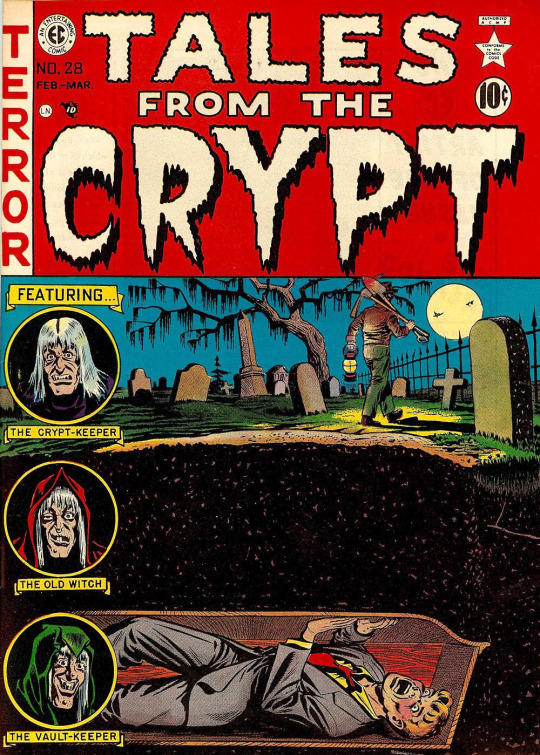
The CCA made it impossible to publish two of the most popular genres in the industry for a generation (the CCA relaxed its stance on horror stuff a bit in the 70s, which is why Marvel trend-chased werewolves and vampires the moment they could get away with it), which not only scrambled the medium (and potentially created space for the Silver Age of superhero comics to flourish) but drove the former titan EC Comics practically out of business. (Indeed, William Gaines of EC Comics believed that the CCA had been specifically worded to drive him out of business.)
So in some ways, the CCA was worse.
#subtexual judaism#cultural history#film history#hays code#comics#comics meta#comics code authority#cinema
199 notes
·
View notes
Text

Vintage Comic - Facts About Code-Approved Comics Magazines
Comics Magazine Association (1958)
#Comics#CCA#Comics Code Authority#Comics Magazine Association#Facts About Code-Approved Comics Magazines#Vintage#Censorship#Frederick Worthheim#Promotional Comics#Art#CGC#1958#1950s#50s#Seduction Of The Innocent#SOTI
17 notes
·
View notes
Note
You’re the resident chilchuck expert, so I was wondering about it there’s any canon evidence that he did smoke or drink alcohol when the kids were younger. I always thought it was something he picked up due to the strain of long jobs, when the kids were already older, but you seem to think differently and I was wondering if there was anything in canon that made you think that way!
Now that you mention it I guess it’s true there’s no evidence he did. Smoking we literally only know he does at all because of one post-canon panel where he has a pipe, so no, maybe this stick-looking thing in the panel below too though, I’m not familiar with medieval blunts eh.
We’ve only gotten one panel of him and his daughters interacting when he was younger so that’s not too insightful on that end, and every time we see him young and freckled it’s in a job context so again not really where we’d expect him to be drinking. The earliest proof (/heavy implication since we don’t see inside his cup I guess) is 3 years before canon when Laios hired him, where he’s at a bar, classily placed in front of all the bottles ✨
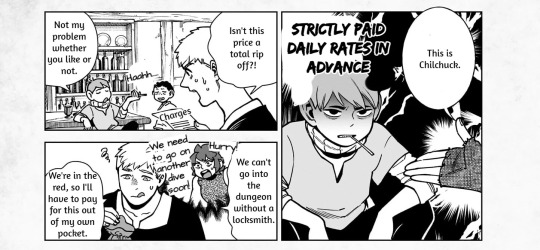
Yes alcohol is almost certainly a way through which he copes especially with stress, so if we go with the theory he started around when work got stressful, well… Chilchuck started working as a dungeon diver ~10 years ago so when he was ~19, making Mei, Fler and Puck ~6 and ~4 respectively, so from that draw the ‘stressful enough to start drinking’ line wherever.
We don’t know what he did before that with any certainty, and it could be he did odd jobs, lived off mostly mutual aid and community work, or just focused on only raising the girls. Half-foots tend to be poor and I see a lot of that in Chilchuck specifically so I don’t think he could have afforded to not have some paying work though.
Alright, so then why do I think he did drink when the girls were younger?
I give a more complete rundown of the info we do have on his alcoholism & his family with panels and references + all the speculation I make from it here. But the most targeted and objective answer I can give is:
Of course there’s just very very little we know of Chilchuck’s life with his family, and I think that’s by design too. I think the details being up in the air is to allow more nuance of the topic, like, will trying to reconcile go well, is their relationship salvageable? We don’t know, because we don’t know. So the message of giving hope a chance even if it’s a long shot, that things could truly go either way, is more relevant, impactful and meta in that way.
How long was he usually away for work travels into dungeons here and there? How did he act with them? All we can really do is "it’s likely that", it’s a game of which way we think it’s more implied. There’s no right and wrong answer, it’s all Marcille-like larping the events out.
My main reason for thinking he did is that his father died from overdrinking and Chilchuck is very aware of that. He mentions his death casually in the extra about their stance in alcohol and in his Adventurer’s Bible profile, etc. He acts towards the alcohol presumably the same way his father did: with abandon, uncaring for the health effects, probably happily too considering Chil says "dying doing something you love is a good way to go". Very nonchalant.
So you see what I’m saying here right, wether he started early or late, his view of alcoholism is very influenced by what he saw of his father growing up, it’s something he’s always been aware of and saw in a mostly positive light, something that was inherited you could say. It’s something that was normalized to him from a young age. Regardless or where it goes from there I do think this part is pretty inarguable.
If he views it positively and we know that in the present alcohol is his favorite food that he loveees, why would he have held out on it? Personally that all makes me think he started drinking very young, especially since I don’t think they limited alcohol to age as much as modern standards (and I mean, teen drinking is obviously still a thing).
And here you could argue, maybe his father only started being more alcoholic later when Chilchuck moved out, or something! And to that there’s nothing I can say except I think that’s a strained theory, and that Chil might even have largely cut contact with his family after moving out (since he and siblings are listed as almost strangers and he doesn’t seem to have much emotional attachment to his parents, but also we know he rents out his place to "a relative"), but it’s true we have no evidence. "I’ve picked up the same unhealthy substance abuse as my father haha! No big deal right haha" repeated several times to me just reeks of intergenerational trauma, & the alcoholism gene as they call it. Like effortless sliding into drinking as if it’s second nature, it’s natural after all, it’s normal after all, it just makes sense, it makes you feel good and that’s what matters.
BUT from my interpretation then we have a whole other layer: Alcohol is of course not all bad always. I think he’s always liked alcohol and drank it on occasion and it brought him joy etc etc, but I think here the implication in the question is, how much effect did his drinking have on the family relations and how early? And that isn’t so much about when him drinking started but when the alcoholism started.
Addiction is defined by a habitual need, that has negative effects from filling that need (physical, psychological, social, etc) and negative effects from withdrawal. If Chilchuck drinks to cope and he can’t not cope without it, that’s addiction, if it affects his relationships, if it’s a need he has, it’s addiction. Addiction can be very insidious or look very casual, and how much people around the person are affected by it is case by case. Cheerful drunks can be sooo annoying and uncomfortable though let me tell you. Drunks are drunks. And this sounds harsh, but even if people around them don’t mind drunks it’ll still have some effects here and there, living with one can be such a challenge, ily drunks good luck with everything much like Chilchuck you deserve good things 🫡
Ok so with the dad thing and the "ok well maybe he’s always drunk casually but it grew worse with time around when he started working as a dungeon diver" precision made, the other bit of info we have that can inform this is that Chilchuck is on a harsh diet and that alcohol is a hunger suppressant. We know Chilchuck "used to be fine not eating for two days", that literally on screen to quench his hunger so it doesn’t keep him awake he goes to drink water, drinking is his instinct to hunger. Again alcohol is a hunger suppressant and if you want info on that the internet has a lot of research and anecdotes about it. He diets to be light enough to not trigger traps, so it’s something he’d have started after dungeon diving most likely. Between the stress and the diet, yes it’s extremely likely he started going harder on alcohol after he started working in dungeons.
There’s arguments on wether two days without eating is less bad for half-foots than humans, but apart from smaller portions there’s nothing that indicates half-foots should get less than 3 meals a day. They need less food but that’s because their bodies are smaller: the need is proportional to the body, not smaller than others’ races, the % of need is similar even if the kg amount of food isn’t. There’s also a popular headcanon with support basis that half-foots run hot and have a faster heartrate and whatnot, and that points towards a faster metabolism rather than a slower one: a bigger need for eating rather than a smaller one. He has the same bmi, 18, as Mickbell, but perhaps because Chil is much taller he’s less intensely visibly underweight with ribs showing than Mick during the bath extra, it’s most apparent when he becomes tallman.
Alcohol is something so important and omnipresent in his character that I have trouble believing it’s something that was part of only a small fraction of his life. It’s his immediate go-to, his no-brainer solution to a good time, I’ve sort of always assumed especially after looking at his family that it’s something he discovered decently young. Like he just acts like someone who’s always had alcohol to fall back on and started young idk. Alcohol is one of his 5 keywords. Alcoholism is very ingrained into his world view and life, his "it doesn’t matter" stance his ‘work hard play hard’ mentality his idea that the world is harsh so you get relief where you can, so it just makes sense to me that it’s always been in his life, if not actively then at least looming.
So yes, in summary, my take:
Alcohol was always something he wholly enjoyed to an unwise level, but it could have been considered casual until he started working into dungeons and his need for it on a regular basis intensified. Alcohol has always had positive association to him as far as we see, so when it started being a problem he didn’t see it as such. To quote him, "I drink anytime I get the opportunity to".
Why always? Approval of father’s alcoholism. Why alcoholism at all? Diet + stress & coping mechanism & emotional stunting + relationship issues, and she decided she had enough after they went out for drinks.
Conclusion
Chilchuck having drunk from a young age makes sense to me and it’s the strongest narrative angle I see on the table, but that’s objectively a me opinion, yes! There’s no evidence, moreso there’s canon basis and supporting info, but it’s all very left up to interpretation. I’ve made my own interpretations of things from the scraps we see, like everyone else making Chilwife and daughters content. Wether you have a stance on the topic or prefer to leave it vague in your takes, it’ll be a matter of what you think makes most sense, or what you’d rather believe I suppose (which is literally fine)
There’s a lot of subjectivity in even just setting up causal links like you probably noticed during this and I was careful with my word choices, because we’re just extrapolating from what we see and unless Kui states it explicitly from a reliable mouth all we can do is have informed opinions on most things. This particular interpretation is influenced by other details I’ve come to form about my interpretation of Chilchuck too, the more psychological and emotional sides of him and the timeline and how his marriage even happened, unplanned pregnancy imo. Like I hope you see what I mean, this wasn’t supposed to be a speculation post just a quick simple answer but there’s sort of just no other and concise but complete way with the subjectivity nuance to put "maybe it could be yes because of this but maybe it could be no because of this" haha
Edit: Wait the phrasing on this… Interesting.
"In recent years"— This does imply that if not just his alcohol consumption increasing then the diversity and quality of it did, so either he indeed did start drinking more (not necessarily meaning he didn’t drink before) assumedly because of his wife leaving, or he started drinking other/more different kinds of alcohol maybe due to the union he formed + his experience gave him greater salary than he had previously (and no wife and family to provide money for), a mix of both perhaps.
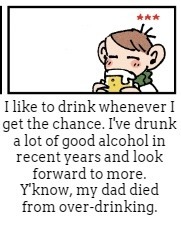
#Also he’s a lot like my own dad so to me with how he is it’s just an immediate “oh yeah he has always drunk duh of course”#So i can admit to bias. Or to specialized knowledge and authority on analysis idk in which way that tips the balance in my favor or not lol#Dungeon meshi#chilchuck tims#meta#alcoholism#This post was meant to be short :|#-slaps chilchuck’s family- this baby can fit in so much projection#I have like 3 chil alcoholism & chil family fic wips rn weeeeee#I’m the kind of alcoholic’s kid who grew up to never touch alcohol btw so like. Ik Chil could not have drunk young i just think he did#Can we appreciate the alcohol opinion & resistance chart actually. So often in media it’s either “alcohol’s a source of fun yippee” and#“alcohol is evil”. Thank you Dunmeshi for diversity of opinion thank you for nuance i rarely feel so seen#Izutsumi deserves to tell Chilchuck he stinks#AND BY THE WAY I hope you don’t feel talked down on anon. Ik you seem to have your own interpretation already & that’s good#sometimes i was adressing like. The General Public TM more than you which is why I spent time on some things like ‘think what you want’ etc#Okok i hope that covers it. Help where does the time go#It’s the sort of thing that makes Kui’s masterful storytelling by implying things here and there until it forms a big picture frustrating#for meta. Like! You can’t prove Chilchuck has been poor/grew up in an empoverished family/environment. There’s no evidence#but also you cannot tell me with a straight face that he isn’t and hasn’t like omg. But then it takes 30 pages to explain how he’s coded#Stop showing and not telling Kui smh /j#Ask#I think a lot about the trolls comic and man he was already so tense and grumpy and yelling. I do think that guy was stress relief drinking
37 notes
·
View notes
Photo
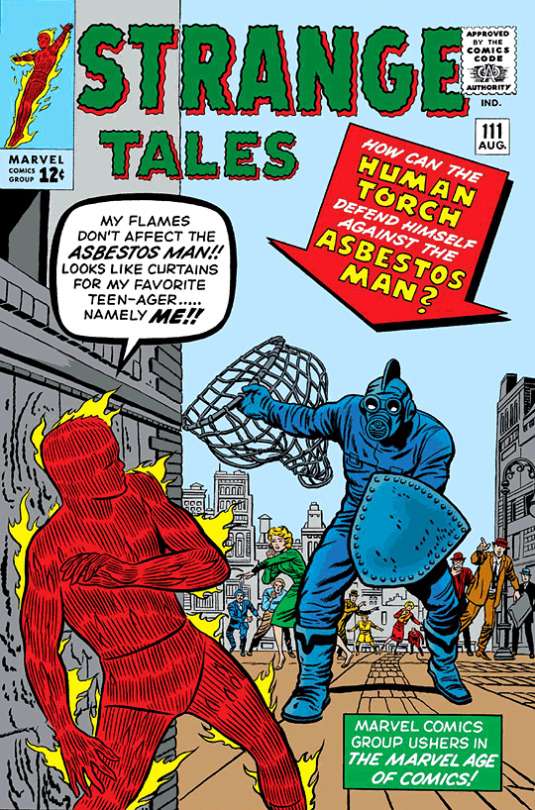
Cover of Strange Tales #111, August 1963. Stan Lee script, Jack Kirby pencils, Dick Ayers inks, Stan Goldberg colors, Artie Simek letters.
#strange tales#human torch#teenager#marvel comics#marvel#marvel comics group#marvel age of comics#asbestos man#superhero#super villain#comics code authority#1960s#comic#comics#comic book#comic books#stan lee#jack kirby#dick ayers#stan goldberg#artie simek#johnny storm#the human torch
143 notes
·
View notes
Text
My brain is a mess atm so I'm gonna try to keep this as cohesive as possible but god. I saw Across the Spiderverse for the second time yesterday night and I had completely forgotten the opening with the Comics Code Authority seal. My first time watching me and my friends laughed at that scene, "Haha lmao they're spoofing on the comics code authority a bit, hell yeah" I had thought, and I moved on to the masterpiece that was ATSP. The second time though, after knowing all the themes and ideas of the movie, the comics code seal hit me like a truck. Because Miles's story could NEVER be approved by the comics code. Neither could Pavitr's, nor Gwen's and definitely not Hobie's for that matter. And this ties back exactly to the themes of the movie because Miles's story is about rejecting conventional storytelling and the norms of what a Spiderman story should be. In the same way that Miguel is so obsessed with maintaining canon, maintaining the status quo of the Spiderman mythos, the entire point of the comics code was to restrict stories with new perspectives that didn't fit a certain agenda. It was when comics were able to break free from the code that we got so much innovation and diversity and complexity. And I know that morally Miguel and the Comics Code are definitely not a 1 to 1 comparison but in a meta sense, viewing ATSV's themes as a commentary on storytelling conventions, it fits perfectly I think.
#i fuckingn. love this movie#any piece of fiction that poses a meta commentary on storytelling norms and breaks through those norms is a masterpiece in my book#i think this is part of why i enjoyed atsv more than itsv#i just have a soft spot for it#across the spiderverse#spiderman across the spiderverse#spiderverse#comics code authority#miles morales#spiderman into the spiderverse#textpost#teatime ramblings
112 notes
·
View notes
Text
conservative X-men fans will see a franchise about an oppressed group of people who fight for their civil rights and freedom in a world that sees them as freaks and monsters and imagine themselves being on the mutants’ side but then can’t even handle masculine cis women in sports or a man with painted nails or cisgender teens on puberty blockers for health issues.
conservative X-men fans will see that oppressed group of freaks and monsters constantly facing the threat of an apocalyptic future specifically caused by hate mongers in powerful positions who very blatantly will and do destroy the same humanity they claim to be protecting if it means destroying Those Freaks and think “wow cool robot.”
conservative X-men fans will agree with the villain who was based on Malcom X and specifically came to hold his beliefs through surviving the Holocaust and claim that he can’t even be considered a villain anymore because his ideology makes sense and is consistently proven right by the humans’ unwavering intolerance, but go into hysterics the minute a real life minority holds any sort of hatred or resentment toward their oppressor.
conservatives in general will always pretend that the media they consume doesn’t have any deeper meaning or purpose other than being entertainment slop because they almost always retreat into media for some type of “comfort” or escape from having to acknowledge reality and their own bigotry. they want the freedom to be bigots without any pushback or consequences so they surround themselves in an echo chamber of fictional characters and universes who can’t argue with them or tell them they’re wrong and bad.
conservatives have to constantly and deliberately turn their brains off to consume a specific piece of media because they know that they would be the villain in it if they gave it an ounce of deeper thought and that’s exactly why they push back so hard against anything that drags them out of their comfy echo chamber, anything that threatens their blissful ignorance.
they thrive on the idea that their media isn’t “that deep” or based in/affected by reality; that there’s no such thing as representation or allegories or coding in media (and alternatively, that representation doesn’t matter or is just propahanda). they thrive on willful ignorance and they want to convince everyone else to be just as ignorant and the death of media literacy is exactly how they’ll achieve it
#this wasn’t supposed to be a long post but whatever i feel very strongly about it as you can tell#very vindicating to verbalize this#cal.txt#reading is fundamental#media literacy#x men#x men comics#do I want to tag conservatism do I really want my neck being breathed on right now#media literacy is important for so many reasons but this especially#I am once again stating the biggest example of fiction affecting reality is propaganda#and the biggest tool of conservatism is media illiteracy to discourage thinking about /how/ it affects reality#or how it’s connected#I am also stating that fiction reflects reality as much as it affects it#fiction is a product of reality and reality can hold products of fiction#everybody uses jaws as an argument but that’s because it’s literally correct#an animatronic shark almost caused the near extinction of an entire species because of fictional fear mongering#the fucking author of the book spent his life helping sharks as best he could to fix the effect his story had#I’m falling asleep now but literally I could talk about this forever and ever#queer coding#allegories#I’m going full autism here#important#tagging as such bc I’m fucking cooking#5 star meal right here personally
9 notes
·
View notes
Photo

I’m reviving Space Skeleton Saturday in honor of L.B. Cole’s March 1954 cover to Ghostly Weird Stories #122. This one debuted just months before the bowdlerizing Comics Code Authority formed in September.
319 notes
·
View notes
Text




"Tygers" in Tales of the Green Lantern Corps Annual #2, 1986, written by Alan Moore, art by Kevin O'Neill. This story had been famously rejected by the Comics Code Authority because of its art.
Here's what Kevin O'Neill himself said about this when he was interviewed by CBR for Comic-Con San Diego 2014:
I actually love that, because it was originally a two-part story with tigers that Alan Moore had written for me. It was gonna be in a regular "Green Lantern" book and Andy Helfer, the editor, rang me up and said, "There's a problem with the Code." My first thought was, "Well, what have I got to change?" and he said, "Nothing. They just don't like the style. There's nothing you can change." I thought that was ridiculous. So I rang Alan and he was green with envy. I thought it was pretty funny. I thought the Code was a funny idea even when I was a kid, I thought that was strange. And I'd heard all these stories about it's just little old ladies in a room reviewing pages and stamping the back. I thought it was mental, isn't it. It's a really regressive way of producing comics.
They held onto the story for some months and then put it out in the annual without the Code sticker, because I think at the time it was beginning to be dismantled. The next time I went to New York, the very, very great Archie Goodwin, I met him, and I said, "Archie, have you got a copy of the Comics Code? I've always wanted to see one." And he went off, he didn't have one, no one had one. He found one in the closet somewhere and there's a phone number on it. And I said, "Do you mind if I, can I ring them up? I'd like to visit them." I rang up the Comics Code in New York and I said who I was, English artist visiting, "I really want to see what you do at the Comics Code." And they said, "There's nothing to see here! There's nothing to see here!" and just put the phone down. [Laughs] I never got to see them. I'd love to know -- I've never seen photos of it. I've no idea how they work. I mean, people told me they send the artwork up there, it was stamped on the back, and it came back. But no one had been over there, as far as I'm aware to see who these people were, or if anyone's doing anything. Is it completely random? You know, were they actually just hiring someone to stamp the back? It's just totally bizarre.
149 notes
·
View notes
Text
I was sexually harassed and touched by a creepy stranger today and my mom said that I should be proud of how attractive I am now that I've lost weight. I swear I'm going to commit crimes that violate the comics code.
159 notes
·
View notes
Note
GRRM says Stan Lee made Comics a "respectable medium", do you agree? I always thought Lee, his involvement in CCA, and Marvel's focus on capeshit under him ultimately held back the medium.
I think it's indisputable that Stan Lee profoundly changed how comics were viewed in American culture (keep in mind, comics used to be seen as only slightly more scandalous than porn); even a more warts-and-all portrait like Riesman's True Believer points out that Stan Lee was a hugely successful promoter, salesman, and public personality. The whole "Merry Marvel Bullpen"/"Marvel Marching Society"/"No-Prize" stuff, the letters columns, the tv shows and cartoons, all of it made Stan Lee kind of the Walt Disney of comic books and made comics seem like a more wholesome pasttime for American adolescents.
Later on, Stan Lee's campus lectures (even though they were ultimately rather facile in their analysis) and his (wildly self-aggrandizing and mendacious) interviews with alternative news organizations like the Village Voice played a big role in making Marvel a significant element of the counter-culture and making comics "cool" for teenagers and college students to read.

Regarding Stan Lee's involvement with the CCA, are you referring to him breaking with the CCA over the Spider-Man issue or something else?
As for the focus on superhero comics, I think that was both incredibly successful and a necessary adaptation, given how the moral panic panic around comics in the 50s centered around horror and crime comics. Keep in mind, there really wasn't a market for what we call indie comics today until the counter-culture emerged in the late 60s/early 70s (and even then, we didn't really see indie comics comics until really the 80s with the British Invasion).
#comics#comics meta#marvel#marvel meta#stan lee#comics code authority#josephine riesman#true believer
58 notes
·
View notes
Text
ok, raise your hand if you chuckled at the “this spiderman comic passes the Comics Code Authority” bit before the movie began?
#atsv spoilers#atsv#spiderman atsv#across the spiderverse#BECAUSE I DID#AND I WAS THE ONLY ONE IN MY THEATER#MY MOM GAVE ME A LOOK#BUT MAMA IT WAS A JOKE#IT WAS A PURPOSEFUL JOKE#AND YOU LAUGH AT JOKES#(also ain’t it funny that Miguel is all authoritarian on what qualifies as a ‘Spider-Man’ and canon events sort of like how the#Comics Code Authority was on the comic book industries’ asses for what qualified as a good comic or kid friendly or graphic enough#or toned down enough or- you get what i’m saying??? KINDA LIKE HOW HOMOPHOBES ARE ON THE LGBT COMMUNITY’S ASS ABOUT#WHAT QUALIFIES AS QUEER ENOUGH OR CHILD FRIENDLY OR FAMILY FRIENDLY OR GOOD CHRISTIAN THEMES OR *gunshots*)
47 notes
·
View notes
Text

dw he's not a real cop and this didnt really happen
#comics code#comics code authority#art#comic#school art#pen#traditional art#art?#sure#doodle#sketch#sketchbook#comics#gay#crime
9 notes
·
View notes